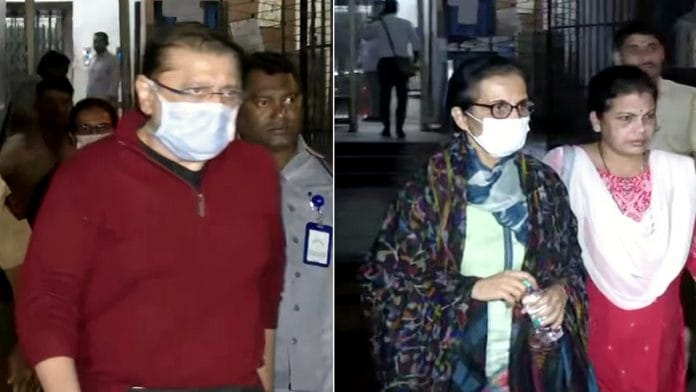New Delhi: The Bombay High Court last week released Chanda and Deepak Kochhar, holding that the arrest cannot be on ‘fancy’ and ‘whimsical’ grounds.
The court said the arrest was in violation of the landmark Arnesh Kumar decision of the Supreme Court which had called for a check on the power of the police to arrest.
In the 2015 judgment, the apex court had said that arrests must be an exception and police officers must first decide if an arrest was necessary under Section 41 of the Criminal Procedure Code (CrPC), 1973.
“Our endeavour in this judgment is to ensure that police officers do not arrest accused unnecessarily and magistrates do not authorise detention casually and mechanically,” the court had said.
Section 41 CrPC empowers the police to arrest individuals without warrant in non-cognizable cases.
The Kochhars were named as accused in the ICICI Bank case, in an FIR filed by the CBI in 2018. Both appeared before the agency several times. However, on 23 December 2022, the CBI arrested the couple because they were named as accused in the FIR and were ‘not cooperating’ with the probe.
The Kochhars were sent to police custody and then judicial custody by the trial court. However, these orders were then challenged before the Bombay High Court which has now held that such an arrest was unnecessary considering the Arnesh Kumar guidelines.
The Kochhars’ case, unfortunately, is not an isolated one. Court orders across states display a pattern of the police routinely arresting individuals in violation of the Arnesh Kumar guidelines – and courts regularly setting aside such arrests.
Also read: Terror accused beheaded man last month, made video for their Pak handler, says Delhi Police
‘Enough’ to set free
Consider, for instance, the arrest of stand-up comedian Munawar Faruqui who was arrested in January 2021 for ‘hurting religious sentiments’.
The Madhya Pradesh HC dismissed his application for bail. However, in February 2021, the Supreme Court allowed the petition, holding that Faruqui’s arrest was in violation of the Arnesh Kumar judgment.
Justice Nariman had noted that if the Arnesh Kumar guidelines were not followed during arrest, that ‘would be enough’ to set the comedian free.
‘State excesses’, contempt of court
The Supreme Court had also rapped the Jharkhand Police when it had arrested a scribe of a local Hindi news channel at midnight in July 2022. Calling such an event ‘excess of the State’, the court had upheld the Jharkhand HC order allowing bail to the journalist.
The HC, while granting bail to the accused, had noted that it appeared prima facie (on first look) that the Arnesh Kumar guidelines were not followed.
It had also said that the court will consider whether to initiate contempt of court proceedings against senior police officials for violation of the guidelines.
‘Fact checks’, ‘basis for everything’
Consider another case – the arrest of Mohammed Zubair, co-founder of the fact-checking website, AltNews, last year.
Zubair was arrested by the Delhi Police over a four-year-old tweet after a complaint was filed by an anonymous user.
Similarly, Nikhil Bhamre, a medical student, was arrested after a tweet about NCP chief Sharad Pawar and was imprisoned for over a month last year.
“There are hundreds and thousands of tweets posted everyday… Is this the basis for everything?”, the Bombay High Court had pulled up the Maharashtra government for Bhamre’s arrest.
‘Shocked to hear’
Just last month, the Madras High Court was ‘shocked’ to hear that a sub-inspector before the court had not read the guidelines for arrest.
In the case where the accused was a person with disability, it had then accepted the finding of the State Human Rights Commission that the arrest was in violation of the norms laid down.
“The very casual manner in which the officer replied to our query, as to whether he had read the judgment in Arnesh Kumar v. State of Bihar and another, shocks us. Such replies will reflect upon the entire police force,” the bench had said.
It reiterated the Supreme Court’s findings that discretion must be exercised to determine whether arrest is required, as it brings ‘humiliation, curtails freedom and leaves scars forever’.
‘Deliberate intention’
The Allahabad High Court, too, had to deal with a similar case. However, this time, the court pulled up the police officer for ‘deliberate’ violation of the arrest guidelines, sentencing him to fourteen days’ imprisonment.
“The misleading entry in the (police’s general diary) GD was made willfully and deliberately with the sole purpose to bypass the mandate in Arnesh Kumar, in order to arrest the accused. The contemnor, in the circumstances, has circumvented the mandate which was binding upon him,”, the bench had said.
(Edited by Smriti Sinha)
Also read: SC on hate speech: Anchors who create divisions in society should be taken off air






